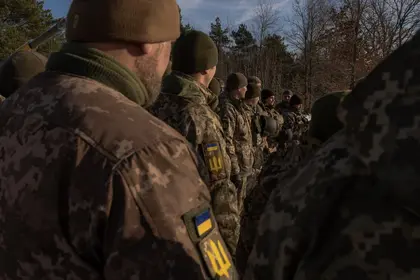The Ukrainian Cabinet of Ministers submitted a new draft law to the – parliament which, if approved, would mean sweeping changes to Ukraine's mobilization rules.
The proposal, registered on the evening of Dec. 25, introduces electronic summons, mobilization plans for individuals with disabilities, and military registration for those living abroad.
JOIN US ON TELEGRAM
Follow our coverage of the war on the @Kyivpost_official.
The next steps involve committee reviews. After the reviews, the draft law will be brought to the full parliament for consideration.
If approved, the key features of the draft law are expected to take effect within a month.
Among the key provisions of the draft law is a proposed change to the conscription age, lowering it from 27 to 25 years old.
Also, the draft law introduces 3-month basic military training for Ukrainians between the ages of 18 and 25.
Responsibilities for organizing the draft, disseminating information about mobilization orders, and calling conscripts to the Territorial Recruitment Center (TRC) are delegated to village, settlement, and city councils.
Introduction of email and employer summons
The draft law introduces summons by email and by employer.
Currently, conscripts can be summoned by letter, by a TRC representative, or by a police officer.
Important reasons for failure to appear at a summons include being blocked by bad weather, falling ill, or the death of a close relative.
Ukrainians between the ages of 18 and 60 would need to carry a military registration document around with them and present it to a TRC representative or police officer if requested, who could then take photos of the document and verify it.

Orban Slams Ukraine’s ‘Hostile’ Statements, Threatens ‘Countermeasures’
Mobilization of people with disabilities
Under current legislation, people with disabilities fall into three categories. Those with the most severe disabilities – in groups one and two, would remain ineligible for mobilization, but under the draft law, those in group three, with less severe disabilities, could be mobilized.
Ultimately, the final call would fall to military medical commissions to determine whether someone was able to serve or not.
Some Telegram groups critical of the draft law identified some of the more severe forms of disability that still fall under the third category:
- blindness in one eye
- paralysis of the hand, stump of the upper limb, absence of fingers
- thigh or lower leg stump; shortening of the leg by 7 centimeters or more
- castration in men
- an inoperable defect of the jaw, when a person cannot chew normally and loses weight
Military registration for Ukrainians abroad
The draft law calls for male Ukrainians living abroad between the ages of 18 and 60 to validate their military registration documents with their local consulates.
Amid martial law conditions, the issuance of Ukrainian or foreign passports to male citizens aged 18 to 60 abroad would also be contingent on having military registration documents.
Restrictions on draft dodgers
The draft law outlines measures for those evading military registration and service. Petitioners failing to comply would be entered into the Unified Register of Debtors and face various restrictions including:
- A ban on traveling abroad
- Prohibitions on property transactions
- Restrictions on driving privileges and obtaining a driver's license
- Limited rights to use and dispose of funds and valuables
- Ineligibility for credit or loan agreements
- Suspension of state benefits and services
These restrictions would be lifted after the person’s name was removed from the list.
Rights to Deferment and Dismissal
Under the draft law, a person can be deferred or released from military service if they have three or more children, are guardians of people with severe disabilities, or if they have close relatives who have died or gone missing in the war with Russia.
Members of Ukraine’s parliament, the Verkhovna Rada, would continue to be deferred from military duty. Civil servants, police officers, prosecutors, and State Executive Service employees could be mobilized, however.
Eligibility for deferments for those pursuing their education would be more limited than now. For example, a person who’s already gotten a bachelor’s degree in one subject wouldn’t be able to go back to school and get a second one in a different subject and have their military service deferred.
Those who have been mobilized and released would be exempt from being mobilized again for two years.
The draft law would establish, for the first time, the right to be discharged after 36 months of continuous service.
What do Ukrainian lawmakers say?
According to Ukrainian Pravda, citing sources from the president’s Servant of the People party, parliamentarians were advised not to comment on the proposed law.
Sources indicated that party leadership emphasized aligning closely with the president due to the “sensitivity of the issue,” and suggested that “mobilization with society should be communicated by the military, from whom this request originates.”
You can also highlight the text and press Ctrl + Enter










